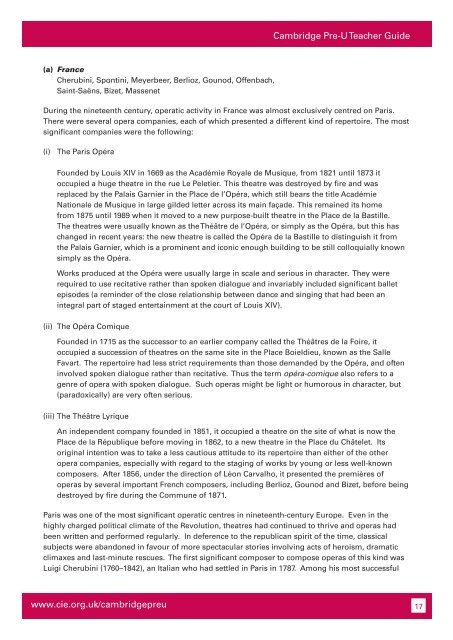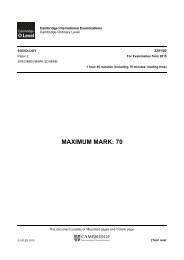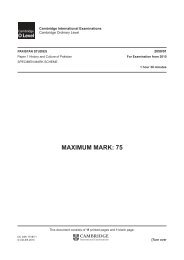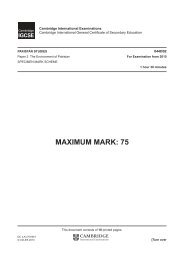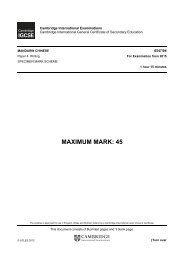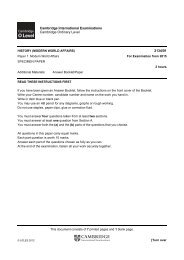Teacher's Guide Cambridge Pre-U MUSIC Available for teaching ...
Teacher's Guide Cambridge Pre-U MUSIC Available for teaching ...
Teacher's Guide Cambridge Pre-U MUSIC Available for teaching ...
You also want an ePaper? Increase the reach of your titles
YUMPU automatically turns print PDFs into web optimized ePapers that Google loves.
(a) France<br />
Cherubini, Spontini, Meyerbeer, Berlioz, Gounod, Offenbach,<br />
Saint-Saëns, Bizet, Massenet<br />
<strong>Cambridge</strong> <strong>Pre</strong>-U Teacher <strong>Guide</strong><br />
During the nineteenth century, operatic activity in France was almost exclusively centred on Paris.<br />
There were several opera companies, each of which presented a different kind of repertoire. The most<br />
significant companies were the following:<br />
(i) The Paris Opéra<br />
Founded by Louis XIV in 1669 as the Académie Royale de Musique, from 1821 until 1873 it<br />
occupied a huge theatre in the rue Le Peletier. This theatre was destroyed by fire and was<br />
replaced by the Palais Garnier in the Place de l’Opéra, which still bears the title Académie<br />
Nationale de Musique in large gilded letter across its main façade. This remained its home<br />
from 1875 until 1989 when it moved to a new purpose-built theatre in the Place de la Bastille.<br />
The theatres were usually known as the Théâtre de l’Opéra, or simply as the Opéra, but this has<br />
changed in recent years: the new theatre is called the Opéra de la Bastille to distinguish it from<br />
the Palais Garnier, which is a prominent and iconic enough building to be still colloquially known<br />
simply as the Opéra.<br />
Works produced at the Opéra were usually large in scale and serious in character. They were<br />
required to use recitative rather than spoken dialogue and invariably included significant ballet<br />
episodes (a reminder of the close relationship between dance and singing that had been an<br />
integral part of staged entertainment at the court of Louis XIV).<br />
(ii) The Opéra Comique<br />
Founded in 1715 as the successor to an earlier company called the Théâtres de la Foire, it<br />
occupied a succession of theatres on the same site in the Place Boieldieu, known as the Salle<br />
Favart. The repertoire had less strict requirements than those demanded by the Opéra, and often<br />
involved spoken dialogue rather than recitative. Thus the term opéra-comique also refers to a<br />
genre of opera with spoken dialogue. Such operas might be light or humorous in character, but<br />
(paradoxically) are very often serious.<br />
(iii) The Théâtre Lyrique<br />
An independent company founded in 1851, it occupied a theatre on the site of what is now the<br />
Place de la République be<strong>for</strong>e moving in 1862, to a new theatre in the Place du Châtelet. Its<br />
original intention was to take a less cautious attitude to its repertoire than either of the other<br />
opera companies, especially with regard to the staging of works by young or less well-known<br />
composers. After 1856, under the direction of Léon Carvalho, it presented the premières of<br />
operas by several important French composers, including Berlioz, Gounod and Bizet, be<strong>for</strong>e being<br />
destroyed by fire during the Commune of 1871.<br />
Paris was one of the most significant operatic centres in nineteenth-century Europe. Even in the<br />
highly charged political climate of the Revolution, theatres had continued to thrive and operas had<br />
been written and per<strong>for</strong>med regularly. In deference to the republican spirit of the time, classical<br />
subjects were abandoned in favour of more spectacular stories involving acts of heroism, dramatic<br />
climaxes and last-minute rescues. The first significant composer to compose operas of this kind was<br />
Luigi Cherubini (1760–1842), an Italian who had settled in Paris in 1787. Among his most successful<br />
www.cie.org.uk/cambridgepreu 17


